必修一 Unit 2 English around the world-Grammar
Unit 2 English around the world-reading-课件 (10)

Elsewhere in Africa and on the Indian subcontinent(次大陆), English is still used as an official language in several countries,even though these countries are independent of British rule.However, English remains very much a second language for most people,used in administration(行政),education and government and as a means of communicating between speakers of different languages.As with most of the Commonwealth(英联邦),British English is the model on which, for instance,Indian English is based.In the Caribbean and especially in Canada,however,historical ties with the UK compete with geographical,cultural and economic (经济的)ties with the USA,so that some aspects (方面)of their English follow British rules and others show US usage.
C
(3)How long did Britain rule India? D A.About 100 years. B.About 50 years. C.About 350 years. D.About 200 years. (4)Who gave American English spelling its own identity? C A.Shakespeare. B.George Washington. C.Noah Webster. D.An English king. (5)Which country may have the largest number of English learners in the world? A A.China.B.Australia. C.India. D.Britain.
高中英语 必修一 Unit2 《English around the world---Reading》
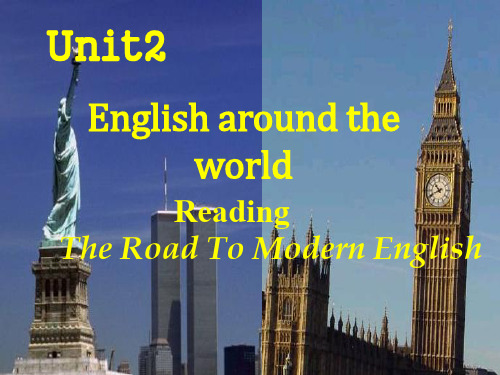
The road to modern English Some British settlers moved to
_A__m_e_r_i_c_a_.
Some British people were taken to
_A__u_s_tr_a_l_ia__.
Para 2
If an American is talking to an Englishman,
____A___.
A. They will have almost no difficulty in understanding
B. They will have a lot of misunderstandings between each other
communication
Para 3
Which of the following statements is true?
• Languages always stay the same. • Languages change only after wars. • Languages no longer change.
Noah Webster Born: October 16, 1758 Died: May 28, 1843 When Noah was 43, he started writing the first American dictionary. He did this because Americans in different parts of the country spelled, pronounced and used words differently.
英语:必修1 Unit2 English around the world--Listening课件(人教新课标)
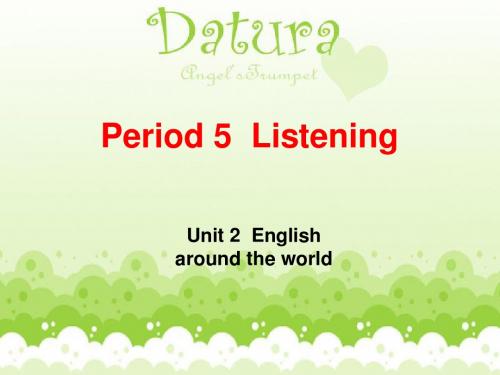
Listening – II ( 10m )
Listening Task on Page 51. • 1. Ask the students to tell the names of the countries where English is spoken. • 2. Finish the listening task. • ( Students give their own answers after listening.)
Conclusion for listening skills (10m)
• After each step of listening, ask the students who did best to tell how he / she did it, other students can have a discussion or ask him / her some questions.Everyone should try his best to find a good way for himself to improve his listening ability.
Listening – I ( 13m )
Listening on Page 14. 1. Listen to the tape for the first time and try your best to get the main idea of what is talking. 2. Listen to the tape for the second time, pay attention to the exercise of page 14. Try your best to find out the answers to these questions.
人教高中英语必修一unit-2-English-around-the-world-单词讲解

latest adj.最新的;最近的;最后的 lately(=recently) adv.最近;近来
选词填空(latter/later/late/lately/latest) ①Here are Tom and David; the _l_a_t_te_r__ is my
04 come up
come up①_上__来__,走__近_②__被__提_出____ ③__发_生__,__出__现___④__发__芽____
英译汉 (1)A foreigner came up to me and asked me the way to the railway station. 一个外国人走到我面前问我去火车站的路。 (2)The grass is just beginning to come up.
(1)vt. 以……为根据
base... on/upon 把……建立在……的基础上 be based on/upon 以……为基础/依据
(2)n.基部;基地;基础 at the base of 以……为基点;在……的底部
1.你不应该把自己的快乐建立在别人的痛苦之上。
You shouldn’t base your happiness on/upon the other’s sadness.
④The koala(考拉) is native ___to____Australia.
____考__拉__原___产__于__澳__大__利__亚__。________________________
请替换文字内容
点击添加相关标题文字,点击添加相关标题文字,点击添加相关标题 文字,点击添加相关标题文字,点击添加相关标题文字。
高中英语 必修1 (Unit2 English around the world the 5th period) 精品教案
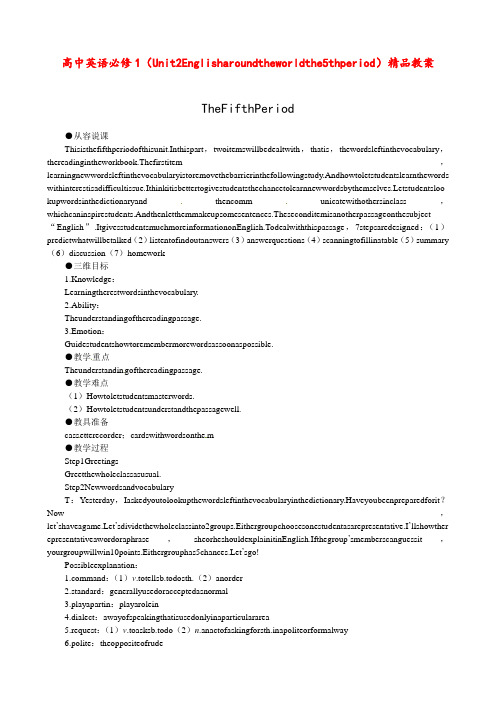
高中英语必修1(Unit2Englisharoundtheworldthe5thperiod)精品教案TheFifthPeriod●从容说课Thisisthefifthperiodofthisunit.Inthispart,twoitemswillbedealtwith,thatis,thewordsleftinthevocabulary,thereadingintheworkbook.Thefirstitem,learningnewwordsleftinthevocabularyistoremovethebarrierinthefollowingstudy.Andhowtoletstudentslearnthewords withinterestisadifficultissue.Ithinkitisbettertogivestudentsthechancetolearnnewwordsbythemselves.Letstudentsloo kupwordsinthedictionaryand thencomm unicatewithothersinclass,whichcaninspirestudents.Andthenletthemmakeupsomesentences.Theseconditemisanotherpassageonthesubject “English”.ItgivesstudentsmuchmoreinformationonEnglish.Todealwiththispassage,7stepsaredesigned:(1)predictwhatwillbetalked(2)listentofindoutanswers(3)answerquestions(4)scanningtofillinatable(5)summary (6)discussion(7)homework●三维目标1.Knowledge:Learningtherestwordsinthevocabulary.2.Ability:Theunderstandingofthereadingpassage.3.Emotion:Guidestudentshowtoremembermorewordsassoonaspossible.●教学重点Theunderstandin gofthereadingpassage.●教学难点(1)Howtoletstudentsmasterwords.(2)Howtoletstudentsunderstandthepassagewell.●教具准备cassetterecorder;cardswithwordsonthe m●教学过程Step1GreetingsGreetthewholeclassasusual.Step2NewwordsandvocabularyT:Yesterday,Iaskedyoutolookupthewordsleftinthevocabularyinthedictionary.Haveyoubeenpreparedforit?Now,let’shaveagame.Let’sdividethewholeclassinto2groups.Eithergroupchoosesonestudentasarepresentative.I’llshowther epresentativeawordoraphrase,sheorheshouldexplainitinEnglish.Ifthegroup’smemberscanguessit,yourgroupwillwin10points.Eithergrouphas5chances.Let’sgo!Possibleexplanation:mand:(1)v.totellsb.todosth.(2)anorder2.standard:generallyusedoracceptedasnormal3.playapartin:playarolein4.dialect:awayofspeakingthatisusedonlyinaparticulararea5.request:(1)v.toasksb.todo(2)n.anactofaskingforsth.inapoliteorformalway6.polite:theoppositeofrude7.retell:totellastoryagainorinadifferentform8.accent:awayofsayingwordsthatshowswhatcountry,esfrom9.recognize:toknowwhothepersonis10.eastern:inorfromtheeast ofacountryorplaceT:Welldone!Nowlet’sdealwiththesomeofthewordsandphrasesindeal.mandv.命令,指挥commandsb.todo;commandsth.;博得,应得commandthat-clausee.g.Hecommandedhismantoretreat.ThetroopswerecommandedbyGerneralHaig.Thekingcommandedthatshe(should)beexecuted.(建议,命令,要求一类词后从句中用虚拟语气,此类动词有suggest,advise,order,request,require,command,demand...)Hecommanded thebuilding(should)betorndown.n.命令[C];指挥,控制[U]e.g.Areyourefusingtoobeymycommands?Youmustobeyhiscommandthatthebuilding(should)betorndown.Takecommandof;beincommand;underone’scommand;underthecommandofsb.e.g.Shetookcommandofthisclassaftertheformermanagerleft.Shefeltincommandofherlife.ThebattleshipisunderthecommandofCaptainBlake.2.requestv.requeststh.(fromsb.);requestsb.todo;requestthat-clausee.g.Youcanrequestafreecopyoftheleaflet(宣传单).Youarerequestednottosmokeintherestaurant.Sherequestedthatnoone(should)betoldofherdecision untilthenextmeeting.n.request(forsth.);request(that)e.g.Requestsforvisaswillbedealtwithwithin48hours.Herrequestthatmoresweetsbeservedwasrefused.3.recognize辨认出;意识到;承认recognizesb./sth.(by/fromsth.)通过……认出……;recognizesth.(assth.);把……认作是……recognizethat意识到;承认e.g.Irecognizedthehousefromyourdescription.Drugswerenotrecognizedasaproblemthen.Nobodyrecognizedhowurgentthesituationwas.Werecognizedthatthetaskwasnoteasy.4.standardn.规格,标准[C&U]raise/improve/lowerstandard提高/降低标准set(sb.)astandard给某人定一个标准e.g.Hesethimselfsuchahighstandardthatheoftendisappointshimself.ofhigh/lowstandard具高/低标准的standards行为标准,道德标准amanofhighstandards一个道德高尚的人Step3ReadingT:WehavelearntEnglishformanyyears.Theninyouropinion,whatisaveryimportanthelptoyourEnglishstudy?S:teachers,books,tapes...T:Anythingelse?IsthereanythingthatyoucanturntoforhelpwhenyouareconfusedwhilelearningEnglish?S:Ithinkadictionaryisagreathelp.T:Yeah.Whenwemeetacrossnewwordsweoftenlookthemupinadictionary.Whatisthemostwidely-useddictionaryinChin ese?S:XinhuaDictionary.T:ThenwhichonedoyouthinkisusedwidelyinEnglish?S:I’msorryIhavenoidea.T:It’s LongmanDictionary andthe OxfordEnglishDictionary.Today,we’llreadapassageonthe OxfordEnglishDictionary.Nowaccordingtothetitle,whatdoyouthinkwillbementionedinthepassage?S:Ithinkthewriter,thetimewhenwasitwritten,whyitwaswritten,howitwaswritten,thefeatureofthedictionarywillbementioned.T:Now,let’slistentoittoseewhetheryouranswerisrigh t.(afterlistening)T:Doyouthinkthatyouranswerisright?S:Ithinkthatitdoesn’tmentionthefeatureofthedictionary.T:Yes.Nowlet’sreaditaloudtoanswerthesequestionsthen.①Whywasitwritten?②Whendiditstarttobewritten?③Whoisthewriter?④Howitwaswritten?S:①Toencourageeverybodytospellthesame.②Theideawasraisedin1857.And22yearsl ater,itbegantobewritten.③Threemenworkedtogetheronthedictionary:SamuelJohnson,NoahWebster,andJamesMurray.④Ittookthethreemennearlyalloftheirlivestotrytocollectwords.T:Goodjob!Thenwhofirstbegantoworkonthedictionary?S:Murray.T:Yes.Nowlet’sreadthelastparagraph.AndthenfinishthetableaboutnotesonJamesMurray’slifewithyourpartners.(checktogether)Step4Consolidation/discussionT:Afterreadingit,canyousaysomethingaboutMurray?Let’sdoachainreaction.EachstudentjustsaysonesentenceaboutMurray.T:Doyouthinkitworthsothesepeople’sspendingsomuchtimeon?Why?Nowdiscusswithyourpartnerandlistsomereasons.(discussforabout3minutes)Now,it’sshowtime.S:Wethinkthatitworththeirjob.Iftherewerenodictionaries,peoplewouldhavenoruletoguidethemwhileusingthelanguage,whichwillleadtoamessinEnglishbecausedifferentpeople wouldusedifferentlawstouseit.Thentherewillbemoredifficul tyinunderstandingoneanother.Withthedictionary,peoplehaveasetruletojudgewhethertheirwayofusingthelanguageisright.Step5SummaryandhomeworkToday,wehavelearnedthewordsleftinthevocabularyandwe’vegotsomeinformationonthelargeEnglishdictionary.Afterclass,pleasereadthewordsagainandagaintorecitethemandtrytousethemtomakeupsentences.●板书设计Unit2EnglisharoundtheworldTheFifthPeriodWordsmand2.request3.recognize4.standardUnderstandingofthepassageGuessingQuestions●活动与探究ThisresearchistodoresearchontheconceptoftheOxfordDictionaryandsomeotherkindsofdictionaryinEnglishspok encountries.SostudentsshouldworkingroupstostudytheitemsoftheOxfordDictionaryandfindoutthenamesofothertypenames Themostpopularone ThereasonAbout theOxfordEnglishDictionaryThe OxfordEnglishDictionary istheacceptedauthorityontheevolutionoftheEnglishlanguageoverthelastmillenniu m.Itisanunsurpassedguidetothemeaning,history,andpronunciationofoverhalfamillionwords,bothpresentandpast.Ittracestheusageofwordsthrough2.5millionquotationsfromawiderangeofinternationalEnglishlan guagesources,fromclassicliteratureandspecialistperiodicalstofilmscriptsandcookerybooks.The OED coverswordsfromacrosstheEnglish-speakingworld,fromNorthAmericatoSouthAfrica,fromAustraliaandNewZealandtotheCaribbean.Italsooffersthebestinetymologicalanalysisandinlistingofvariantspelli ngs,anditshowspronunciationusingtheInternationalPhoneticAlphabet.Asthe OED isahistoricaldictionary,itsentrystructureisverydifferentfromthatofadictionaryofcurrentEnglish,inwhichonlypresent-daysensesarecovered,andinwhichthemostcommonmeaningsorsensesaredescribedfirst.Foreachwordinthe OED,thevariousgroupingsofsensesaredealtwithinch ronologicalorderaccordingtothequotationevidence,i.e.thesenseswiththeearliestquotationsappearfirst,andthesenseswhichhavedev elopedmorerecentlyappearfurtherdowntheentry.Inacomplexentrywithmanystrands,thedevelopmentovertimecanbeseeninastructurewithseveral“branches”.TheSecondEditionofthe OED iscurrentlyavailableasa20-volumeprint edition,onCD-ROM,andnowalsoonline.Updatedquarterlywithatleast1000newandrevisedentries,OED Onlineoffersunparalleledaccesstothegreatestcontinuingworkofscholarshipthatthiscenturyhasproduced’(Newsweek).Tofindoutmoreaboutthe OED Online,whynotfollowourfree tour?“Aboutthe OxfordEnglishDictionary”invitesyoutoexploretheintriguingbackgroundanddistinctivecharacterofthe OED.Here,youwillfindin-deptharticlesaboutthehistoryofthe OED,aninsidelookattheprogrammesusedtoenlargeandupdatethe OED entries,little-knownfactsaboutitscontent,andmuchmore.。
英语:必修1 Unit2 English around the world--Period4 Reading课件(人教新课标)
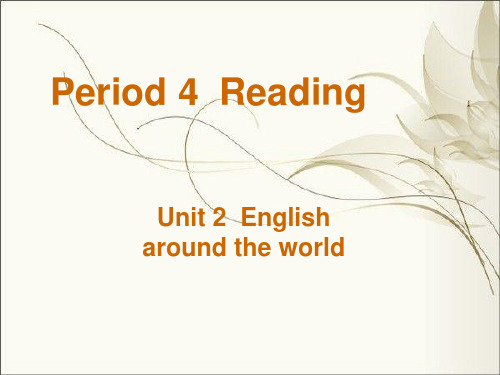
Who worked on it? Date of completion Other information
Country Education Job Most important task
Scotland Village school then taught himself. Work in a bank, teacher. Its difficulties: the biggest dictionary, work in a place where it is too hot or cold, work alone at first, only used pen and paper. Qualities needed: hard work, interest in the job, patience. Who worked on it? Murray, his two daughters and other editors. Date of 1982 completion Other information
Country
Education Job Most important task
Scotland
Village school then taught himself. Work in a bank, teacher. Its difficulties: the biggest dictionary, work in a place where it is too hot or cold, work alone at first, only used pen and paper. Qualities needed: hard work, interest in the job, patience. Murray, his two daughters and other editors. 1982
人教新课标版高一必修1_Unit_2_English_Around_the_World-reading
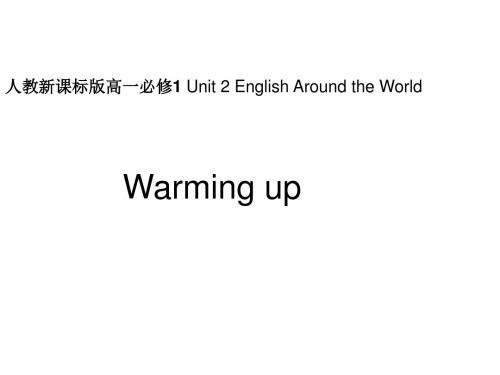
8. come up 上来, 走近; 被提出; (植物)发芽; (太 阳)升起 come up to sp 上某地来 come up with 提出 想出 He came up with a good idea in the meeting. 问题在会议中被提出来了。 •The problem came up in the meeting.
Find out the main idea for each paragraph
Time Between about ______ 1150 and AD450 _____
How is English developed?
England and based more on Spoken in ________ German _____.
语动词用单数。
More than one student wants to
go swimming.
高考链接
We advertised for pupils last autumn,
and got ___ 60. A. more than B. more of C. as much as D. so many as
1.Which of the following statement is true? A. Languages always stay the same B. Languages change only after wars
C. Languages no longer change
D. Languages change when cultures change
even if they don’t speak the same kind of English. adj. native land 祖国,故乡 native language 本族语言,母语 be native to The giant panda is native to Sichuan. n. 土著居民 study the habits of the natives even if= (even though) 尽管;即使 Even if the road is full of difficulty, I will never lose heart.
高中英语 必修1 (Unit2 English around the world the 4th period) 精品教案
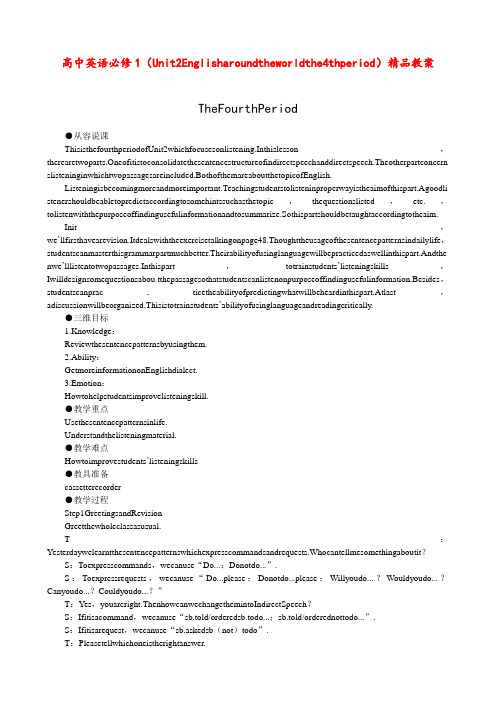
高中英语必修1(Unit2Englisharoundtheworldthe4thperiod)精品教案TheFourthPeriod●从容说课ThisisthefourthperiodofUnit2whichfocusesonlistening.Inthislesson,therearetwoparts.Oneofitistoconsolidatethesentencestructureofindirectspeechanddirectspeech.Theotherpartconcern slisteninginwhichtwopassagesareincluded.BothofthemareaboutthetopicofEnglish.Listeningisbecomingmoreandmoreimportant.Teachingstudentstolisteninproperwayistheaimofthispart.Agoodli stenershouldbeabletopredictaccordingtosomehintssuchasthetopic,thequestionslisted,etc.,tolistenwiththepurposeoffindingusefulinformationandtosummarize.Sothispartshouldbetaughtaccordingtotheaim.Init,we’llfirsthavearevision.Itdealswiththeexercisetalkingonpage48.Thoughttheusageofthesentencepatternsindailylife,studentscanmasterthisgrammarpartmuchbetter.Theirabilityofusinglanguagewillbepracticedaswellinthispart.Andthe nwe’lllistentotwopassages.Inthispart,totrainstudents’listeningskills,Iwilldesignsomequestionsabou tthepassagesothatstudentscanlistenonpurposeoffindingusefulinformation.Besides,studentscanprac ticetheabilityofpredictingwhatwillbeheardinthispart.Atlast,adiscussionwillbeorganized.Thisistotrainstudents’abilityofusinglanguageandreadingcritically.●三维目标1.Knowledge:Reviewthesentencepatternsbyusingthem.2.Ability:GetmoreinformationonEnglishdialect.3.Emotion:Howtohelpstudentsimprovelisteningskill.●教学重点Usethesentencepatternsinlife.Understandthelisteningmaterial.●教学难点Howtoimprovestudents’listeningskills●教具准备cassetterecorder●教学过程Step1GreetingsandRevisionGreetthewholeclassasusual.T:Yesterdaywelearntthesentencepatternswhichexpresscommandsandrequests.Whocantellmesomethingaboutit?S:Toexpresscommands,wecanuse“Do...;Donotdo...”.S:Toexpressrequests,wecanuse“Do...please;Donotdo...please;Willyoudo...?Wouldyoudo...?Canyoudo...?Couldyoudo...?”T:Yes,youareright.ThenhowcanwechangethemintoIndirectSpeech?S:Ifitisacommand,wecanuse“sb.told/orderedsb.todo...;sb.told/orderednottodo...”.S:Ifitisarequest,wecanuse“sb.askedsb(not)todo”.T:Pleasetellwhichoneistherightanswer.“____________,”LiMingsaidtohisteacher.A.Canyoubuymeanewwatch?B.Givemethatbook,C.Lendmeyourbike,D.CouldyouhelpmewithmyEnglish?S:IthinkDistherightanswer.T:Couldyoutellmewhy?S:BecauseAisnotlogical.BandCarecommands.Inlastperiodwelearntthatcommandsshouldbemadebypeoplewhohaveaut hority.SoIthinkhereDisright.T:Yourexplanationisperfect.Step2Talking(WorkbookP48)T:Great.Nowlet’spractisethesentencepatternsbymakingupdialogues.SopleaseturntoP48andlookatthepartoftalking.Ple a seworkingroupsoffour.Andchooseonesituationtorole-play.(5minutesforpreparation)T:Nowlet’sbegin.Possibleversion:Group1:A.(foreigner):Excuseme,couldyougivemeahand?B:Sure.Youseemtobelookingforsomeone.A:Yes.MyChinesefriendsandIpromisedtomeetattheexitofthesubway.B:Couldyouspeakabitslowly.Ican’tquitefollowyou.IguessyouarelookingforyourChinesefriends.A:I’msorry.Iwasn’tnoticingitjustnow.Yeah,wesaidthatwewouldmeethere—theexitofthesubwayat2p.m.Anditis2:15,butIstillcannotfindthem.B:Exit1orExit2?A:Whatdoyoumean?There’re2exits?B:Yes.Herearetwoexits.Soyoushouldbesurewhichoneiswhereyoupromisedtomeet.A:Isee.Iamsurethattheymustbewaitingformeattheotherexit.Thankyouverymuch!Group2:(P:parents;W:waitress;Y:you)P:Excuseme,couldyoutellmewherethetoiletis?W:Er...therestroom?Well,gostraightahead,anditwillbeattheendofthecorridor.P:Butwedonotneedrest.Wearejustlookingforatoilet.Y:ImeanwewanttogotheWC.W:WC?Wedon’thaveone.Y:NoWC!HowcanarestauranthavenoWC?W:I’msorry!ButwhatdoyoureallymeanbysayingWC?Y:It’saplacewherewecanwashhands.W:Ah,Isee.Well,gouptothesecondfloor.Y:Thankyousomuch!(Youandyourparentsgo uptwofloorsbutonlyfindemptyroomsthere.)W:Haveyoufoundit?Y:No,wewentuptwofloors,butwedidn’tfindatoiletbutemptyrooms.Group3:A:Excuseme,couldyouhelpme?B:Sure?What’sit?A:OurEnglishteacheristellingussomethingimportant,butIcanquitefollowher.She’sspeakingsofast.B:Yeah,she’sreallyspeakingfast.ThenhowcanIhelpyou?A:Couldyouasktheteachertospeakalittlebitslowly?B:OfcourseIcan,butwhydon’tyoudoso?A:Er...B:Isee.(StudentBputsup hishand)T:Yes?B:I’msorry,butwouldyouspeakalittleslowly?Step3Listening(Ⅰ)T:Yesterday,wehavelearntsomethingaboutdialectsintheUS.Todayletuslistentothedialoguespokenwithanaccent.Pleaseturntothelis teningpartonP14.Firstlistenandfindouthowmanypeoplethereareinthedialogueandwhotheyare.S:...T:Great!Nowpleaselistentoitagain,andanswerthequestionsonthetextbook.(afterlistening)Haveyougottheanswers?Nowcomparenoteswithyourpartner.T:Areyousureaboutyouranswersnow?Let’schecktogether.T:Youdidaverygoodjob.Nowwewilllistentoitagain.Afterthat,youshouldretellthestorytoyourpartner.See?S:...T:Soyousee,thereissomedifficultyforpeopletounderstandthedialects.Right?So whatwedowhilelearningEnglish?S:WecanlearnstandardEnglish.S:Idon’tthinkso,becausewehavelearntthatthere’snostandardEnglishactually.SoIthinkwhatweshoulddoistopronouncebetter,andusethecorrectwordsandgrammar.Step4Listening(Ⅱ)T:Byreadingthepassage“theroadtomodernEnglish“,wehaveknownEnglishisaworldlanguagewhichisspokeninmanycountriesandareas.Inthisperiodwewilllistentonatives peakersfromdifferentEnglish-speakingcountries.PleasemovetoP51andlookatListeningTask.Nowseveralstudentsina ninternationalhighschoolinShanghaiaredescribingwheretheycomefrom.Whatdoyouthinkyouwillhearintheirintroduc tion?S:Iguesstheywilltalkaboutthelocation,climate,people,custom,specificthings,andsoon.T:Youareveryclever.Weareintroducing someplace,mostoftimewewillgivesom edescriptionoftheclimate,people,custom,people,history,placesofinterests,andsoon.T:Listencarefully,thentellwhichtopicsarementioned.S:...T:Good.ThenIwillplaythetapeagain.Thistimeyoushouldtrytoguessthenameofeachstudent’scountry.S:...T:Goodjob.Thistime,youshouldpaymuchattentiontoeachstudent’sdescription.Afterlisteningitagain,youshoulddescribethecountryusingyourownwords.S:...T:Welldone!NowworkingroupsoffouranddiscusswithyourpartnerswhyEnglishisspokeninsomanyplacesaroundtheworl d.Makealistofthereasonsandthenreportyourgroupworkwithothergroups.Step5SummaryThisclasswehavereviewthegrammarpartbyusingitindailylife.Wehavepractisedreadingaswell.Welearnthelangua geinordertouseit.SoIadviseyoupractiseusingwhatwelearntdailysothattheycanbepartofyourknowledge.Step6HomeworkLookupthewordsleftinthevocabularyinthedictionary.●板书设计Unit2EnglisharoundtheworldTheFourthPeriodSentencepatternsGuessingthetopicsmentionedinthetape●活动与探究Thisactivityistodosomeresearchonthelisteningskills.Studentsarerequiredtosurftheinternettosearchforsomeinfor mationonadviceonimprovinglistening.●备课资料ColorsAmericanshaveusedcolorstocreatemanyexpressionstheyuseeveryday.Wesayweare“inthepink”whenweareingoodhealth.Itiseasytounderstandhowthisexpressionwasborn.Whenmyfacehasanicefresh,pinkcolor,itisasignmyhealthisgood.IfIlookgrayandashen,Imayneedadoctor.Redisahottercolorthanpink.AndAmericansuseittoexpressheat.InEnglish,thesmallandhotpeppers(辣椒)foundinmanyMexicanfoodsarecalled“redhots”,fortheircolorandtheirfiery(火辣辣的).Wesaythatfast,fierymusic,especiallythekindcalled“DixielandJazz”is“redhot”.Blueisacoolercolor.ThetraditionalbluemusicofAmericanblacksistheoppositeoftheredhotmusic.Itisslow,sadandsoulful.DukeEllingtonandhisorchestra(管弦乐队)recordedafamoussong,MoodIndigo(《深蓝的情调》),aboutthedeepbluecolor,indigo.Inthewordsofthesong,“Youaren’tbeenbluetillyou’vehadthatMoodIndigo”.Tobe “blue”,ofcourse,istobesad.Whilethecolorgreenisnaturalfortrees,itisanunnaturalcolorforhumans.Whensomeonedoesnotfeelwell,someonewhoissickforexample,wesayhelooksgreen.Whensomeoneisangrybecausehedoesnothavewhatsomeoneelsehas,wesayheis“greenwithenvy (忌妒)”.Somepeopleare“greenwithenvy”becausesomeoneelsehasmoredollars,or “greenbacks”.Dollarsarecalledgreenbacksbecausethat’sthecolorofthebacksideofthemoney.Thecolorblackisoftenusedinexpressions.Peopledescribeadayinwhicheverythinggoeswrongasa“blackday”.A “blacksheep”isthememberofafamilyorgroupwhoalwaysseemstobeintrouble.A“bla cklist”isillegal(非法的)now,butatonetime,someemployers sharedblacklistsofpeoplewhoshouldnotbegivenwork.Notallthe“black”expressionshavebadmeanings.Abusiness“intheblack”,forexample,isonewithprofits(利润).Acompany“inthered”islosingmoney.Redinkisusedtoshowlossesinafinancialreport.Profitsarewritteninblack.Ifsomeonetellsyoutoputsomet hing“inblackandwhite”,theywantyoutowriteitdown.Insomecases,colorsjustdescribeasituation.A“blackout”,inWorldWarTwo,waswhenalllightswereturnedofftomakeitdifficultforbomberplanestofindtheirtarget(目标)atnight.A“brownout”isanAmericanexpressionforreducedelectricalpowerwhichmakeselectriclightsdim.AmericanwomenusetheFrenchwordforredasthenameofthecoloredcosmetic(化妆品)whichtheysometimesusetobrightentheircheeks.It’sjustcalled“rouge”.Theyuseitespeciallywhentheyaregoingoutfortheevening,orasAmericanssay“topaintthetownred”.Thecoloryellowissometimesusedtodescribeacoward(胆小鬼).Apersonwhois“yellow”hasnocourage.Aperson’sskinmaybecomeyellowasaresultofdiseasesthatattacktheliver(肝).Yellowfeverisone.Inthepast,shipscarryingfevervictimsraisedaflagcalled the“yellowjack”.IntheUnitedStates,anactivisto rgan izationofoldpeoplecallsitselfthe“graypanthers”(灰豹).Thenamecomesfromthegrayhairofitsmembersandfromthepanther,afierceanimalofthelionorleopard(豹)family.WordsandIdiomsToeatcrow乌鸦肉根本没法吃,因此要一个人吃乌鸦,那肯定是非常难受的。
- 1、下载文档前请自行甄别文档内容的完整性,平台不提供额外的编辑、内容补充、找答案等附加服务。
- 2、"仅部分预览"的文档,不可在线预览部分如存在完整性等问题,可反馈申请退款(可完整预览的文档不适用该条件!)。
- 3、如文档侵犯您的权益,请联系客服反馈,我们会尽快为您处理(人工客服工作时间:9:00-18:30)。
(5). 若直接引语的谓语中含有would, should, might, must, used to, ought to, had better等动词时。如: She said, “We should help each other.” → She said we should help each other.
例如: He said: “I’ve left my book in my room.” → He told me that he had left his book in his room.
2.疑问句的间接引语。一般疑问句后连接
词用if或whether,而引述选择疑问句时
只能用whether,引述动词用asked,没
4. Rose asked Tom, “Did you see my
purse?”
Rose asked Tom ___.
A. whether that he had seen her purse
B. whether he had seen her purse
C. that whether he had seen her purse
Grammar
ቤተ መጻሕፍቲ ባይዱ
复习 (把下列直接引语改为间接引语) 1.He said: “I’ve left my pen in my room.”→ He told me that he had left his book in his room. 2.She said: “He will be busy.”→
The mother asked Tom to get up early.
直接引语如果是以“Let’s”开头的祈
使句,变为间接引语时,通常用 “suggest +动句词(或从句)。” 例如: He said, "Let’s go to the film." →He suggested going to the film.
D. told me; not to do
3.“Don’t put it on my hat.”his wife said to him.
His wife told him ___put it on ___hat.
A. don’t, his
B. don’t, her
C. not to, his
D. not to, her
1.The teacher said to the students,
“Don’t waste your time.” →
The teacher told the students not
to waste their time.
2.The mother said, “Tom, get up
early, please.”→
→ The
teacher asked me how I had repaired it.
4.如何变时态:
直接引语
一般现在时 一般将来时 现在进行时 一般过去时 现在完成时 过去完成时
间接引语
一般过去时 过去将来时 过去进行时 过去完成时 过去完成时 过去完成时
如: 1) She said. “I have lost a pen.” →She said she had lost a pen. 2) She said. “We hope so.” →She said they hoped so. 3) She said. “He will go to see his friend.” →She said he would go to see his friend.
但要注意在以下几种情况下。在 直接引语变为间接引语时,时态 一般不变化。
(1)直接引语是客观真理。 “The earth moves around the sun and the moon moves around the earth”, the teacher told me. → The teacher told me the earth moves around the sun and the moon moves around the earth .
有间接引语的可以加一个间接宾语me, him等。 例如: She said to Tom, “Can you help me?” → She asked Tom if /whether he could help her.
3. 特殊疑问句用原句中的疑问词作连接 词,改为陈述语序。例如:
The teacher asked, “how did you repair it?”
D. that if he has seen her purse
5.He asked me ________ with me.
A. what the matter is B. what the mater was C. what’s the matter D. what was the matter
指示代词、时间状语、地点状语的变 化: this→ that; these→ those ; now→ then; yesterday→ the day before; today→ that day; tomorrow→ the next day; next week (month, year)→ the next week (month, year); ago→ before; here→ there.
C. asked ; to close
D. said to; please close
2. He said, “Don’t do that again.” He _____ me _______ that again. A. said to me; not to do B. said to me; don’t do C. told me; don’t do
10.He said, “Mother, the boy is very
naughty.”
→He ____ very naughty.
A. said his mother that the boy was B. said to his mother that the boy is C. told his mother that the boy was D. spoke to his mother that the boy was
练一练 1. He said, “My sister was here for three days.” He said that____ sister ___ _____ his had been ____ for there ___ three days. 2. She said ,”I’ll go there tomorrow.” She said that ___ would go there she _____ ___________. the next day
5.如何变状语:
直接引语变间接引语,状语变化有其内
在规律,时间状语由“现在”改为“原 来”例: now变为then, yesterday变为 the day before, today变为that day。 地点状语, 尤其表示方向性的, 或用指示 代词修饰的状语, 由“此”改为“彼”
(例: this 改为that), 如: He said, "These books are mine." →He said those books were his.
解析:如果直接引语是“What’s the matter?” “What’s wrong?” “What’s the trouble?”, 变间接引语时语序不
变.
6. He asked , “Are you a Party member or a League member?”
→He asked me ______.
She said that he would be busy.
3.She said to Tom, “Can you help me?”→ She asked Tom if/whether he could help her.
复习规律
1. 陈述句的间接引语—连接词用that, 在
口语中可省略。引述动词用said, told,等。
或He suggested that they should go to
see the film.
练一练 1.“Please close the window,” he said to me. →He ______ me _____ the window.
A. said to; to close
B. told to; closing
3. She said, “Did you see him last night?” She _____ me __________________ asked if/whether I had seen him _______________. the night before 4. “When did you go to bed last night?” Father said to Peter. Father asked Peter ______________ _____ when he went to ____ the night ______. bed before
祈使句的直接引语和间接引语 祈使句的间接引语——采用 “动词+宾语+不定式”结构。 told/asked/ordered sb. (not) to do
sth.
如果祈使句是表示请求,间接引语的 动词常用ask,如果是表示命令,间接 引语的动词常用tell, order, command 等。
例如:
解析: 反意疑问句要 变成whether或 if引导 的宾语从句 .
